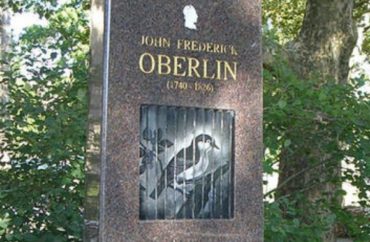
One of the much-derided lines from the George W. Bush administration was “either you are with us, or you are with the terrorists.” It implied that questioning a given policy decision was not the hallmark of a good ally.
Oberlin College students and administrators know something about allies. They are expected to blindly affirm whatever a supposedly oppressed group says or does, without either presuming to speak for them or asking them to speak for themselves.
This is a complete rejection of the values of the private Ohio school’s namesake. But it’s in line with the black-and-white values of Oberlin’s founder.
Writing in The Wall Street Journal, former Oberlin President S. Frederick Starr analyzes the college’s recent defamation loss in a bakery’s lawsuit through the lens of its historical figures.
John Frederick Oberlin, a pastor whose monument was commissioned under Starr’s presidency, made his mark through marriage counseling. He helped spouses see that they can learn from each other even while disagreeing.
The message that “people with diverse perspectives can live in friendship with one another” is at “the heart of the aspirations of this college,” Oberlin’s monument reads.
But Oberlin’s founder, Charles Grandison Finney, is much closer to the values and spirit of today’s woke students and crusading administrators such as Meredith Raimondo, who facilitated student activists’ defamatory campaign against the bakery for protecting its merchandise from theft.
Starr writes:
Finney, a fierce enemy of Calvinism and the sparkplug of the so-called Second Great Revival, believed human beings could be perfected if only specific evils and their perpetrators could be stamped out. In this frightening doctrine, Finney manifested what the University of Virginia psychiatrist Vamik Volkan called “the need to have enemies and allies.”
The early Oberlin was not only antislavery to the point of militancy but also anti-alcohol and anti-art, according to Starr: “Book burning was not unknown in early Oberlin’s early days.” It swung the other way starting in the early 20th century, affirming “modern learning, thought, music and art” and graduating two Nobel Prize winners.
Oberlin’s attempt to destroy Gibson’s bakery recalls the “squinty-eyed hounding of enemies” that Finney pioneered, writes Starr, a longtime fan of the bakery and :
Few if any students, administrators or trustees know anything about Finney, and today’s zealots are militantly secular. Yet they concur with each other and with Finney on the need for enemies, even if the enemy du jour is a small family business that has happily thrived in Lorain County, Ohio, for 130 years. Could anything be more bluntly at odds with Johann Friedrich Oberlin, who devoted his life to serving humble parishioners?
Like The College Fix on Facebook / Follow us on Twitter




Add to the Discussion